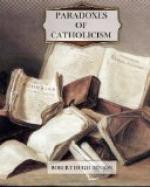The Church, on the other hand, is very clear and insistent that body and soul make one man as fully as God and Man make one Christ; and she illustrates and directs these strange co-relations and mutual effects of these two partners by her steady insistence on such things as Fasting and Abstinence. And the saints are equally clear and insistent. There never yet has been a single soul whom the Church has raised to her altars in whose life bodily austerity in some form has not played a considerable part. It is true that some have warned us against excess; but what warnings and what excess! “Be moderate,” advises St. Ignatius, that most reasonable and moderate of all the saints. “Take care that you do not break any bones with your iron scourge. God does not wish that!”
Pain, then, has a real place in our progress. Who that has suffered can ever doubt it again?
Let us consider, therefore, under this Word of Christ, whether our attitude to bodily pain is what God would have it to be. There are two mistakes that we may be committing. Either we may fear it too little—meet it, that is to say, with Pagan stoicism instead of with Christianity—or we may fear it too much. Despise not the chastening, on one side, or faint on the other. It is surely the second warning that is most needed now. For pain had a real place in Christ’s programme of life. He fasted for forty days at the beginning of His Ministry, and He willed every shocking detail of the Praetorium and Calvary at the end. He told us that His Spirit willed it and, yet more kindly, that His Flesh was weak. He revealed, then, that He really suffered and that He willed it so.... I thirst.
THE SIXTH WORD
It is consummated.
He has finished His Father’s business, He has dealt with sinners and saints, and has finally disclosed to us the secrets of the Soul and the Body of His that are the hope of both sinners and saints alike. And there is no more for Him to do.
An entirely new Beginning, then, is at hand, now that the Last Sabbath is come—the Last Sabbath, so much greater than the First as Redemption is greater than Creation. For Creation is a mere introduction to the Book of Life; it is the arrangement of materials that are to be thrown instantly into confusion again by man, who should be its crown and master. The Old Testament is one medley of mistakes and fragments and broken promises and violated treaties, to reach its climax in the capital Mistake of Calvary, when men indeed knew not what they did. And even God Himself in the New Testament, as man in the Old, has gone down in the catastrophe and hangs here mutilated and broken. Real life, then, is now to begin.
Yet, strangely enough, He calls it an End rather than a Beginning. Consummatum est!




